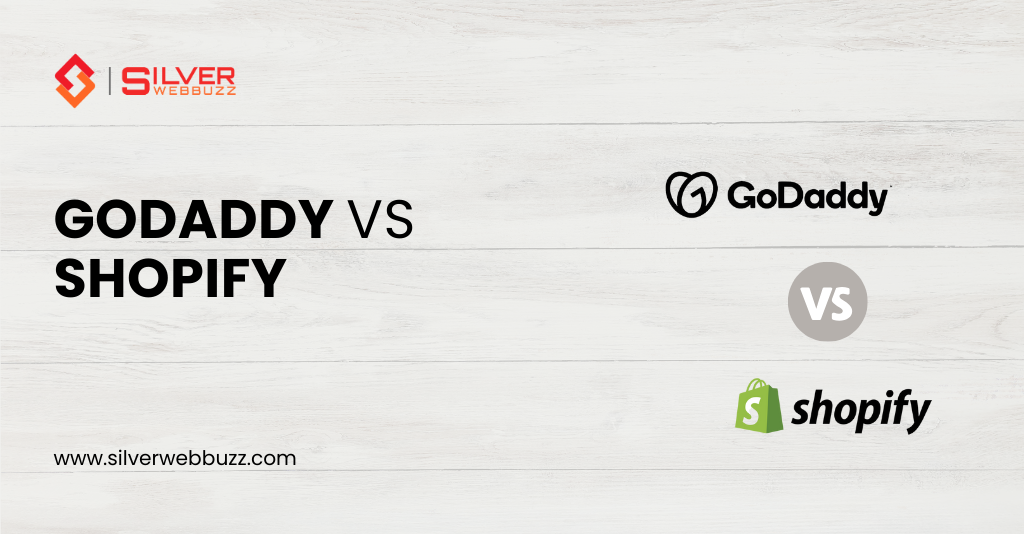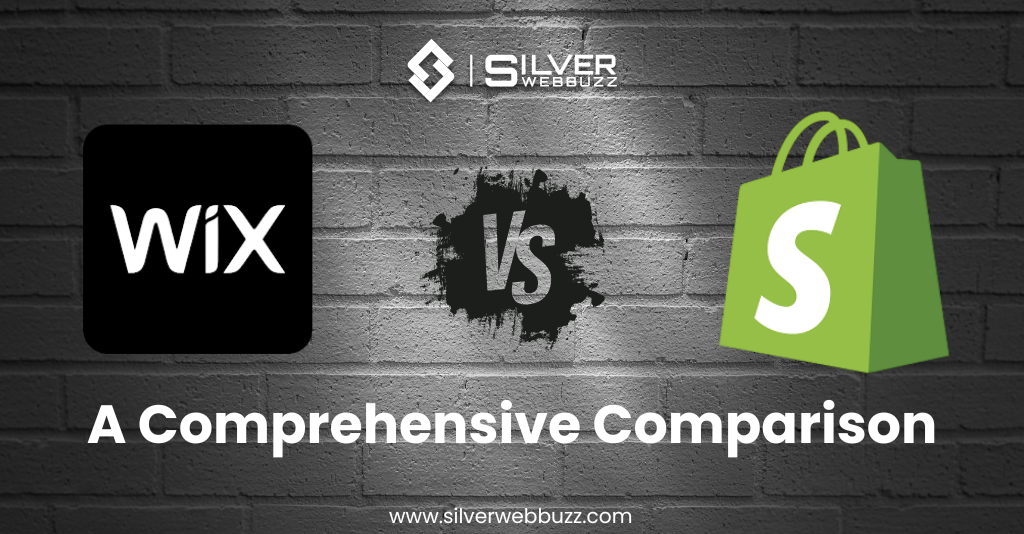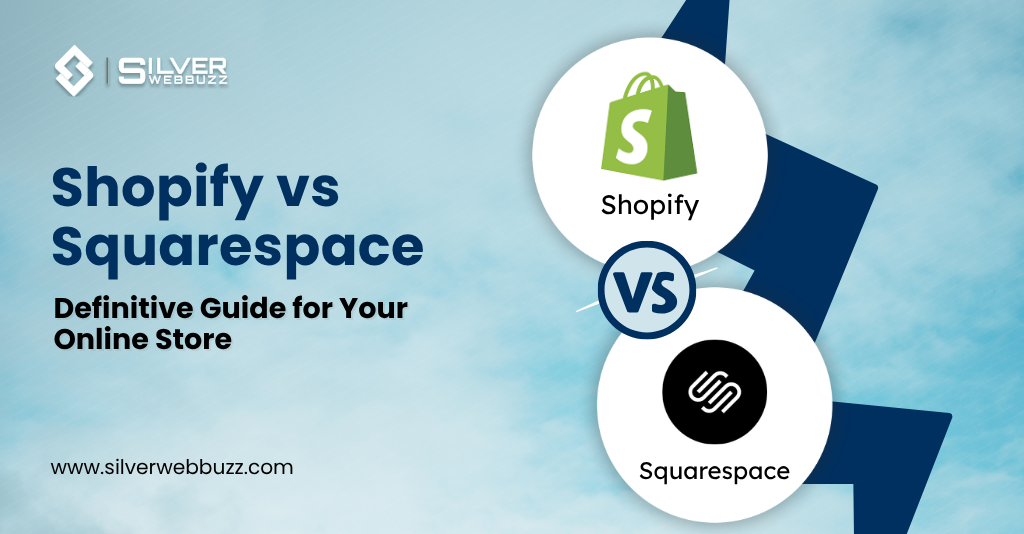Choosing the right platform for building and running an online store can define the success or failure of a business. Two of the most popular options business owners consider today are GoDaddy and Shopify. While GoDaddy has long been recognized as a domain registrar and hosting provider, it has evolved into a simple website builder and e-commerce solution. Shopify, on the other hand, has built its reputation as a dedicated e-commerce platform designed to support everyone from small business owners to global brands.
In 2025, the e-commerce landscape continues to evolve rapidly. Businesses are seeking solutions that are not only easy to set up but also capable of scaling as sales increase, offering seamless integrations, robust SEO features, and strong security. This makes the comparison of GoDaddy vs Shopify more relevant than ever.
According to Statista, global retail e-commerce sales are projected to surpass $8 trillion by 2027, indicating that online competition will intensify. Choosing the right platform now positions you to capture a share of that growing market (Statista, 2024).
GoDaddy Overview
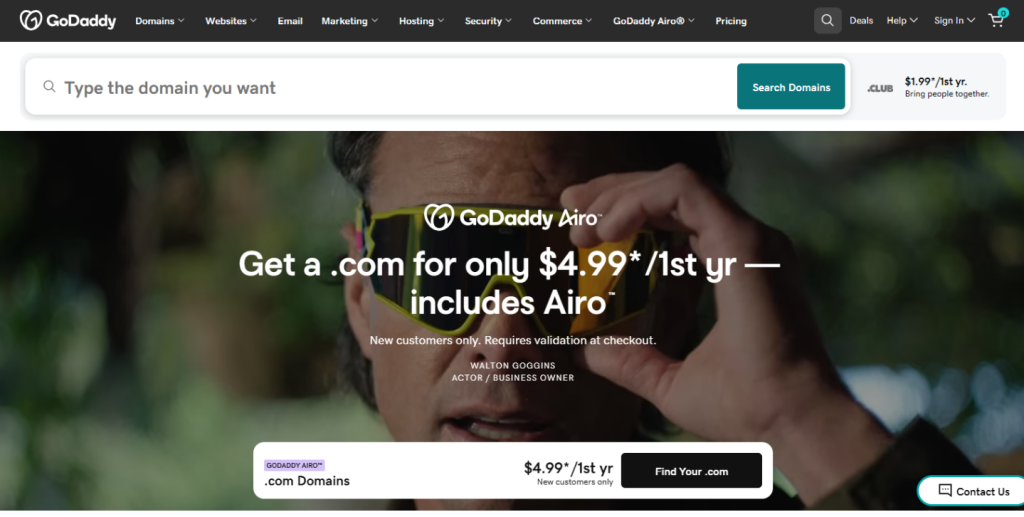
GoDaddy is one of the most recognizable names in the internet space, originally known as the world’s largest domain registrar. Founded in 1997, GoDaddy built its reputation on domain registration, hosting, and DNS services. Over time, it evolved into a comprehensive website-building and e-commerce solution, competing with platforms like Wix, Squarespace, and Shopify.
Today, GoDaddy’s Website + Marketing platform combines a drag-and-drop website builder, built-in e-commerce functionality, and marketing tools — all designed to help beginners launch a site quickly. Its key strength lies in simplicity. You can choose a template, customize it with AI-driven tools, connect your domain, and start selling products within hours.
Key strengths of GoDaddy include:
- Speed of Setup: Extremely fast onboarding process — perfect for users with no coding experience.
- Integrated Domain & Hosting: Everything under one roof — domain, email, hosting, and website builder.
- Affordable Entry Pricing: One of the most budget-friendly options for launching a small online presence.
- Basic Marketing Tools: Includes email marketing, social media posting, and appointment booking.
However, GoDaddy’s website builder was designed with simplicity in mind, not deep e-commerce functionality. Its features are best suited for small businesses, local shops, or individuals who need a straightforward online store with limited product SKUs. If your goal is to manage large inventories, run a dropshipping business, or expand globally, you may find GoDaddy’s features restrictive over time.
Shopify Overview

Shopify is one of the most powerful and widely adopted e-commerce platforms in the world. Launched in 2006, Shopify was built from the ground up with a single focus — to help entrepreneurs sell online. Unlike GoDaddy, which started as a domain registrar, Shopify has always been an e-commerce-first solution, which is why it has become the go-to choice for businesses that take online selling seriously.
Today, Shopify powers over 4.6 million live websites globally (BuiltWith, 2025), ranging from solo entrepreneurs to billion-dollar brands like Gymshark and Allbirds. It offers everything you need to launch, manage, and scale an online store — including website hosting, product management, payment processing, marketing tools, analytics, and integrations with major marketplaces and social media platforms.
Key strengths of Shopify include:
- E-commerce-First Design: Every feature is built to optimize selling, from product pages to checkout.
- Massive App Ecosystem: Over 8,000 apps to extend functionality (subscriptions, reviews, upselling, etc.).
- Scalability: Supports small businesses, growing brands, and enterprise-level merchants with Shopify Plus.
- Multi-Channel Selling: Seamless integrations with Amazon, eBay, Instagram, Facebook, and POS systems.
- Robust Infrastructure: PCI-compliant, high-performance servers, and enterprise-level security.
Shopify’s focus is on growth and scalability, making it the best choice for businesses with ambitions beyond a simple online presence. While it has a slightly steeper learning curve compared to GoDaddy, its powerful features and flexibility more than make up for it — especially for businesses looking to scale internationally or handle high transaction volumes.
Ease of Use: GoDaddy vs Shopify
Ease of use is one of the most important factors for business owners when choosing a platform. Both GoDaddy and Shopify are designed to make website creation accessible to users without technical expertise — but they do so in very different ways.
Setup Process
GoDaddy is designed for speed and simplicity. Once you sign up, you can choose a template, use GoDaddy’s AI-powered site builder to customize the design, and connect your domain in just a few clicks. Most users can launch a basic site or store in under an hour.
Shopify’s onboarding process is slightly more structured. It guides you through store setup step by step — adding products, configuring shipping rates, setting up taxes, and connecting a domain. While it takes a bit longer than GoDaddy’s quick setup, it ensures that your store is fully optimized for selling from day one.
Dashboard & User Experience
GoDaddy’s dashboard is very clean and minimal, ideal for users who want to keep things simple. However, its limited options may feel restrictive as your store grows.
Shopify’s dashboard is more comprehensive, with clearly organized menus for products, orders, analytics, and marketing. While it offers more features, it can initially feel overwhelming for beginners. The advantage is that you get more control and customization options as you become familiar with the platform.
Learning Curve
GoDaddy has almost no learning curve — perfect for complete beginners. Shopify has a slight learning curve, especially when exploring advanced features like Shopify apps, automation workflows, and SEO settings. That said, Shopify’s learning curve pays off in the long run because you gain access to more powerful tools for scaling.
Winner: Shopify. While GoDaddy is faster to set up, Shopify wins because its structured onboarding prepares you for long-term success. The extra setup time results in a fully optimized store with more growth potential and fewer limitations later on.
Website Design & Customization
Design and customization options play a major role in creating a professional online presence that reflects your brand. Here’s how GoDaddy and Shopify compare:
GoDaddy: Templates & AI-Driven Design
GoDaddy’s website builder uses an AI-driven design system that creates a starter site based on your business category. You can then customize colors, fonts, and layouts using a simple drag-and-drop editor.
- Pros: Extremely quick, minimal effort required, mobile-friendly templates by default.
- Cons: Limited design flexibility. You can’t fully customize templates or add complex layouts. Advanced CSS or JavaScript customization is not supported.
This makes GoDaddy ideal for users who want a ready-made site with light customization, but not for those who want a unique, fully branded experience
Shopify: Themes & Deep Customization
Shopify offers over 150 themes (free and paid) designed specifically for e-commerce. Each theme is fully responsive and optimized for conversion.
- Pros: Full control over HTML, CSS, and Liquid (Shopify’s template language) for deep customization. Thousands of third-party themes available.
- Cons: Requires more effort to set up a truly unique look, and premium themes add extra cost.
Shopify is perfect for businesses that want to stand out visually and build a highly customized storefront with tailored user experiences.
UX/UI Differences
GoDaddy focuses on simplicity, while Shopify is designed for professional storefronts. Shopify’s themes often have built-in features like product quick view, mega menus, and optimized checkouts — things GoDaddy lacks.
Winner: Shopify. While GoDaddy’s templates are beginner-friendly, Shopify clearly wins this round. Its theme ecosystem, design flexibility, and ability to create custom experiences make it the better choice for businesses that care about branding, user experience, and long-term scalability.
E-commerce Features & Functionality
When it comes to running a successful online store, the depth of e-commerce functionality matters more than anything else. This is where Shopify and GoDaddy differ the most.
GoDaddy: Basic E-commerce Tools
GoDaddy’s e-commerce solution is built for small stores with simple needs. Key features include:
- Support for up to 5,000 products (with basic inventory tracking).
- Ability to sell physical and digital products.
- Integrated appointment booking and service scheduling.
- Abandoned cart recovery on higher-tier plans.
- Basic shipping and tax management.
However, GoDaddy lacks advanced tools like bulk product management, automated workflows, or native support for subscriptions and dropshipping. Its system works well for local shops or side hustles but becomes limiting as your business scales.
Shopify: Full-Scale E-commerce Platform
Shopify is designed as an end-to-end e-commerce solution and offers a much deeper feature set:
- Unlimited products with advanced inventory management.
- Product variants, collections, and custom attributes.
- Native support for dropshipping, subscription models, and digital products.
- Advanced order management, automation, and analytics.
- Shopify POS for in-person selling, syncing online and offline inventory.
- Omnichannel selling — list products on Amazon, eBay, TikTok, Instagram, and Facebook directly from the dashboard.
- Built-in mobile optimization for both storefront and checkout.
Shopify’s app store also allows you to extend functionality with tools for loyalty programs, B2B pricing, wholesale management, and advanced shipping rules — giving you an enterprise-level toolkit without needing custom development from scratch.
Mobile Optimization
Both GoDaddy and Shopify offer mobile-friendly websites, but Shopify goes a step further with mobile-first checkout optimization, a dedicated mobile app for store management, and access to Shop Pay — one of the highest-converting accelerated checkout options in the industry.
Winner: Shopify. This is where Shopify dominates. While GoDaddy provides basic selling tools, Shopify delivers a professional-grade e-commerce platform with advanced inventory management, omnichannel selling, automation, and scalability. For anyone serious about running or growing an online business, Shopify is the clear winner in terms of features and long-term growth potential.
Payment Gateways & Transaction Fees
Payment processing is one of the most critical aspects of running an online store. The right platform should support multiple payment options, minimize transaction fees, and offer seamless checkout experiences for customers.
GoDaddy: Payment Options & Fees
GoDaddy integrates with a limited set of payment processors, including GoDaddy Payments (powered by Stripe), PayPal, Apple Pay, and Google Pay.
- Transaction Fees: GoDaddy Payments charges 2.3% + $0.30 per online transaction (U.S. rate).
- International Coverage: Available mainly in select regions — limited options for global sellers.
- Flexibility: Fewer payment gateway options compared to Shopify.
While GoDaddy Payments is simple and cost-effective for U.S.-based sellers, international merchants may find its limited coverage a barrier when expanding globally.
Shopify: Payment Options & Fees
Shopify offers over 100 payment gateways worldwide, including Shopify Payments, PayPal, Stripe, Amazon Pay, and various regional providers.
- Shopify Payments: 2.4%–2.9% + $0.30 per online transaction (no additional transaction fees).
- Third-Party Gateways: Supported globally, but incur an extra fee (0.5%–2% depending on plan).
- Multi-Currency & Multi-Language Support: Built-in, ideal for international businesses.
- Shop Pay: Fast, secure checkout that improves conversion rates.
Winner: Shopify. Shopify is the clear winner for payments. Its global gateway support, built-in Shopify Payments, and multi-currency capabilities make it ideal for businesses targeting customers beyond one country. GoDaddy works fine for small, U.S.-based businesses but lacks the international reach and advanced payment flexibility that Shopify offers.
SEO & Marketing Tools
Strong SEO and marketing capabilities are essential for driving traffic and sales. Here’s how GoDaddy and Shopify compare in this area:
GoDaddy: SEO & Marketing Basics
GoDaddy offers basic SEO tools suitable for beginners:
- Automatic sitemaps and SSL included.
- Editable meta titles, descriptions, and alt text.
- GoDaddy Insight — an AI tool that provides recommendations to improve site performance.
- Built-in email marketing (on higher plans).
- Simple social media posting and Google My Business integration.
While these tools are helpful, GoDaddy lacks advanced SEO controls like full control of URL structures, structured data customization, and a native blogging experience as powerful as Shopify’s.
Shopify: Advanced SEO & Marketing Ecosystem
Shopify is built with SEO best practices by default and provides much deeper customization options:
- Editable meta tags, image alt text, and clean URL structures.
- Automatic sitemaps, fast load speeds, and mobile optimization.
- Full blogging functionality with tagging, categories, and RSS feeds.
- 8,000+ marketing and SEO apps (reviews, upsell tools, schema apps, abandoned cart recovery).
- Built-in integrations with Google Ads, Facebook Ads, TikTok, Klaviyo, and email marketing platforms.
- Shopify Email for newsletters and campaigns.
These features give Shopify merchants an advantage when building long-term traffic and running multi-channel campaigns.
Winner: Shopify. When it comes to growing an online business, Shopify wins decisively. Its advanced SEO control, robust blogging platform, and vast marketing ecosystem make it ideal for businesses looking to build organic traffic and run professional campaigns. GoDaddy covers the basics but cannot match Shopify’s depth and flexibility.
Pricing Plans & Value for Money
Pricing plays a major role when deciding between GoDaddy and Shopify, especially for startups and small businesses. Here’s how they compare in terms of cost and long-term value.
GoDaddy: Affordable Entry Pricing
GoDaddy is one of the most budget-friendly options for launching a basic online store.
- Basic Plan: Starts around $16.99/month (billed annually).
- Standard & Premium Plans: Include more marketing features like email campaigns and appointment booking.
- Commerce Plan: Required for selling products online (starts around $20–$25/month).
GoDaddy’s strength is its low entry cost. For small businesses or personal projects, this makes it easy to get online quickly. However, as your business grows, you may find the feature set restrictive — and you’ll eventually need to migrate to a more robust platform if you outgrow its capabilities.
Shopify: Higher Price, More Features
Shopify’s pricing is higher but reflects its enterprise-grade capabilities:
- Basic Shopify: $39/month — includes full e-commerce functionality.
- Shopify Plan: $105/month — lower transaction fees, better reporting.
- Advanced Shopify: $399/month — advanced reports, lower fees, scaling tools.
- Shopify Plus: Custom pricing for enterprise-level businesses.
While Shopify is more expensive upfront, it includes features GoDaddy doesn’t offer — like unlimited products, advanced inventory management, automation workflows, and multi-channel selling.
Hidden Costs
- GoDaddy: Fewer add-ons but limited growth potential.
- Shopify: Some extra costs for apps, premium themes, and transaction fees (if not using Shopify Payments).
However, these extra costs often pay for themselves through better conversions, more automation, and fewer platform limitations.
Winner: Shopify. While GoDaddy is cheaper to start, Shopify wins on long-term value. The higher price tag gives you access to enterprise-level tools that support business growth, saving you from costly migrations later. If your goal is to scale and run a professional store, Shopify delivers a stronger return on investment.
Customer Support & Community Resources
Reliable customer support and access to resources can make a big difference, especially when issues arise that could impact sales.
GoDaddy: Support & Resources
GoDaddy provides 24/7 customer support via phone and live chat.
- Pros: Fast response times, helpful for basic technical questions, and available in multiple languages.
- Cons: Support quality can be inconsistent — some users report longer wait times or scripted responses.
- Resources: GoDaddy Help Center and knowledge base offer basic tutorials and setup guides, but limited advanced e-commerce documentation.
Shopify: Support & Community
Shopify also offers 24/7 support, including live chat, email, and phone (depending on the plan).
- Pros: Dedicated e-commerce specialists, highly knowledgeable about online selling.
- Community: Shopify has one of the largest e-commerce communities in the world, with forums, webinars, courses, and an ecosystem of certified Shopify Experts.
- Resources: Extensive documentation, blogs, developer guides, and video tutorials make learning easy.
This level of community and documentation ensures that even complex issues can be solved quickly, often without contacting support.
Winner: Shopify. Both platforms offer 24/7 support, but Shopify wins because its support agents specialize in e-commerce and its community resources are far more extensive. This means faster problem resolution and better long-term guidance as your business grows.
Scalability & Growth Potential
Scalability is crucial for businesses that expect growth. Your e-commerce platform should be able to handle more products, more traffic, and more transactions without major disruptions or expensive migrations.
GoDaddy: Suitable for Small-Scale Growth
GoDaddy works well for small businesses and those with limited growth ambitions.
- Can handle up to 5,000 products, but lacks advanced inventory automation.
- Limited integrations with third-party logistics, ERP systems, or complex workflows.
- Not ideal for multi-location fulfillment or large-scale marketing campaigns.
As sales volume and operational complexity grow, GoDaddy becomes restrictive. Many businesses eventually need to migrate to a more robust platform to scale efficiently.
Shopify: Built for Growth
Shopify is designed to grow with your business — from a small shop to a global brand.
- Unlimited products, SKUs, and orders.
- Integrates with ERP, 3PL, and inventory management tools.
- Supports high-traffic stores and flash sales without downtime.
- Shopify Plus (enterprise solution) powers Fortune 500 companies and major DTC brands.
- Built-in automation tools like Shopify Flow streamline scaling processes.
This flexibility allows you to scale seamlessly without rebuilding your entire tech stack.
Winner: Shopify. Shopify wins by a wide margin for scalability. Its infrastructure, integrations, and enterprise-level plans are designed for businesses that want to grow significantly. GoDaddy is fine for local shops and side projects, but Shopify is the better long-term investment for ambitious businesses.
Security & Reliability
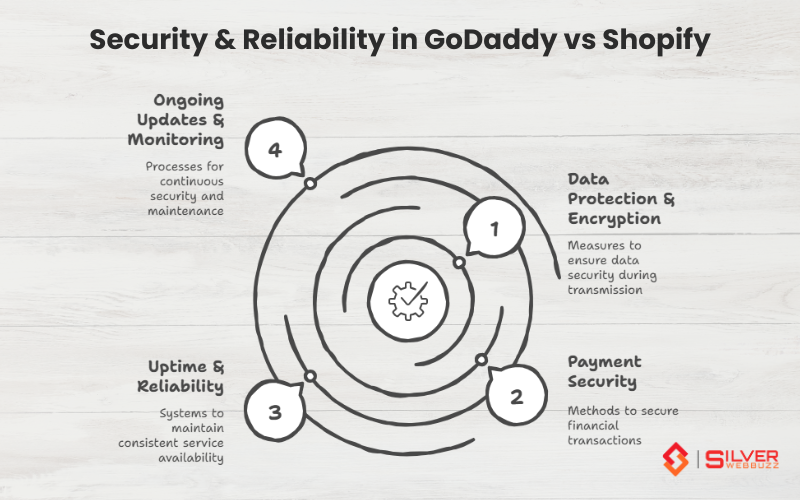
When evaluating any online business platform, security and reliability are non-negotiable. Both GoDaddy and Shopify have invested heavily in infrastructure and security protocols to safeguard user data, transactions, and uptime.
Data Protection & Encryption
- Shopify: All Shopify stores include Level-1 PCI DSS compliance, end-to-end SSL certificates, and automatic HTTPS on every page. This ensures sensitive information like customer payment data remains encrypted during transmission.
- GoDaddy: Offers SSL certificates as part of its hosting and eCommerce packages. However, these are sometimes add-on costs rather than built-in, which can be a consideration for merchants.
Payment Security
- Shopify integrates its own Shopify Payments gateway with built-in fraud analysis and multi-layer authentication. Merchants can also use third-party gateways while maintaining compliance.
- GoDaddy supports multiple payment gateways but may require additional configuration and security plugins to achieve the same level of protection Shopify provides by default.
Uptime & Reliability
- Shopify: Known for its 99.99% uptime, distributed server architecture, and automatic scaling during peak traffic. This minimizes downtime and ensures a consistent shopping experience.
- GoDaddy: Generally offers strong hosting uptime, but it may vary depending on the plan and shared hosting load. Dedicated or VPS hosting options provide better reliability but at extra cost.
Ongoing Updates & Monitoring
- Shopify handles all updates, security patches, and server maintenance automatically — no manual intervention from merchants.
- GoDaddy requires users to manage some aspects themselves, especially for self-hosted or custom solutions, which can increase security risks if neglected.
Winner: Shopify. Shopify wins by a wide margin for security and reliability. Its built-in PCI compliance, automatic updates, and enterprise-level infrastructure make it the safer choice for growing businesses. GoDaddy works for smaller or simpler setups but demands more hands-on management to achieve the same level of protection.
Customer Support
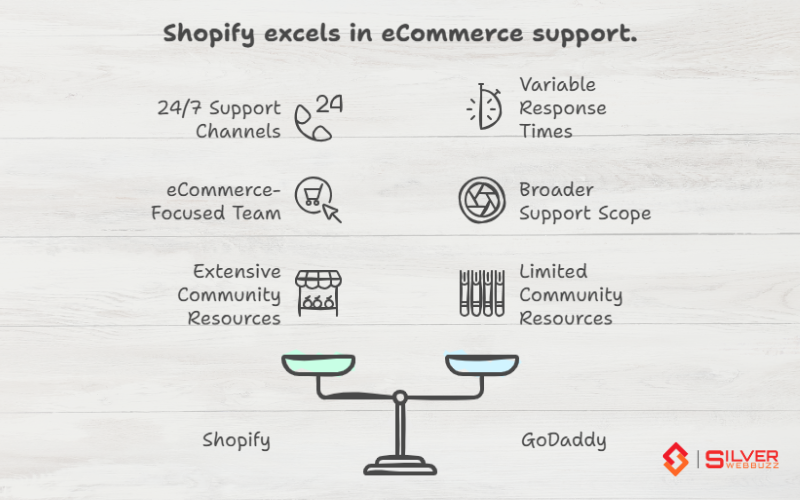
Customer support is a major factor when deciding between GoDaddy and Shopify. As your online store grows, reliable support can save you time, stress, and lost revenue.
Availability & Channels
- Shopify: Offers 24/7 customer support via live chat, email, and phone (in select regions). It also maintains a vast self-service knowledge base, forums, and video tutorials.
- GoDaddy: Provides 24/7 phone and live chat support for most plans. However, response times can vary depending on the time of day and the complexity of the issue.
Quality of Support
- Shopify: Known for its eCommerce-focused support team, meaning agents are trained specifically to handle store-building, payments, and integrations.
- GoDaddy: Primarily a domain and hosting company, so its support tends to be broader and less specialized in eCommerce features compared to Shopify.
Community & Resources
- Shopify boasts an active online community, an app partner ecosystem, and hundreds of certified experts who can be hired for custom tasks.
- GoDaddy has a community forum and support articles but fewer resources dedicated to eCommerce troubleshooting.
Winner: Shopify. Shopify comes out ahead in customer support thanks to its 24/7 eCommerce-focused team, richer self-service content, and an extensive network of experts. GoDaddy’s support works well for domains and hosting but is not as specialized for online retail.
Pricing & Value for Money
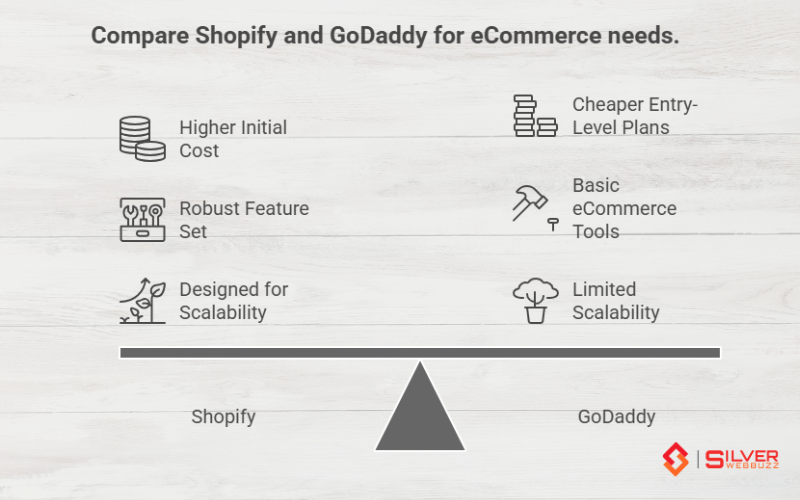
Pricing plays a crucial role in choosing the right platform. Both Shopify and GoDaddy offer tiered plans, but their pricing structures and what you get for your money differ significantly.
Pricing Structure
- Shopify: Offers three main plans (Basic, Shopify, Advanced) plus Shopify Plus for enterprises. Pricing starts higher than GoDaddy but includes a robust feature set out of the box — PCI compliance, unlimited bandwidth, abandoned cart recovery, and more.
- GoDaddy: Offers cheaper entry-level plans for small stores. However, advanced eCommerce features often require add-ons or upgrades, which can add up over time.
Included Features
- Shopify: Every plan includes SSL, 24/7 support, multiple sales channels, inventory management, and advanced reporting tools (depending on the tier).
- GoDaddy: Includes basic eCommerce tools in its standard plan but lacks many advanced features like deep analytics, automated marketing, or built-in multi-channel integrations unless upgraded.
Scalability & Long-Term Costs
- Shopify: Designed to scale with your business. As you grow, you can upgrade plans or move to Shopify Plus without changing platforms.
- GoDaddy: More budget-friendly for very small or local stores, but limited scalability means businesses may outgrow the platform sooner and face migration costs.
Winner: Shopify. Shopify delivers better value for money for serious eCommerce businesses. While GoDaddy may be cheaper upfront, Shopify’s built-in features, scalability, and long-term ROI make it a more cost-effective choice for growing stores.
Final Verdict
If you’re looking for a quick, low-cost way to launch a small or local online store, GoDaddy can be a suitable option. It’s simple, budget-friendly, and good for businesses that only need the basics. However, if your goal is to build a serious, scalable online store, Shopify is the clear winner.
Shopify is designed specifically for eCommerce. A reliable Shopify Development Company can help businesses leverage its stronger security, better scalability, deeper integrations, and long-term value compared to GoDaddy.
